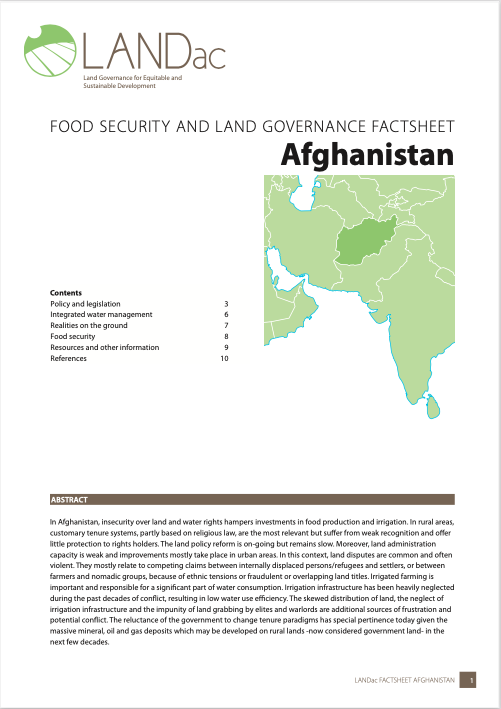Resource information
In Afghanistan, insecurity over land and water rights hampers investments in food production and irrigation. In rural areas, customary tenure systems, partly based on religious law, are the most relevant but suffer from weak recognition and offer little protection to rights holders. The land policy reform is on-going but remains slow. Moreover, land administration capacity is weak and improvements mostly take place in urban areas. In this context, land disputes are common and often violent. They mostly relate to competing claims between internally displaced persons/refugees and settlers, or between farmers and nomadic groups, because of ethnic tensions or fraudulent or overlapping land titles. Irrigated farming is important and responsible for a significant part of water consumption. Irrigation infrastructure has been heavily neglected during the past decades of conflict, resulting in low water use efficiency. The skewed distribution of land, the neglect of irrigation infrastructure and the impunity of land grabbing by elites and warlords are additional sources of frustration and potential conflict. The reluctance of the government to change tenure paradigms has special pertinence today given the massive mineral, oil and gas deposits which may be developed on rural lands -now considered government land- in the next few decades.
This country factsheet was prepared under auspices of LANDac – The Netherlands Academy on Land Governance. The initial version (2012) was compiled by the Royal Tropical Institute (Thea Hilhorst and Nicolas Porchet, KIT) at the request of the Ministry of Foreign Affairs – The Netherlands.
In 2016, the factsheet was updated by Mr. Tom Haythornthwaite in collaboration with LANDac (Gemma Betsema, LANDac/ UU) with support from the Food and Business Knowledge Platform (F&BKP) as part of the LANDac/F&BKP knowledge agenda on land governance and food security.

